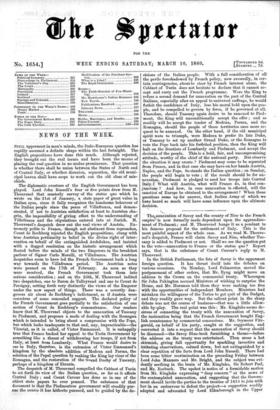NEWS OF THE WEEK.
STILL uppermost in men's minds, the Italo-European question has rapidly assumed a definite shape within the last fortnight. The English propositions have done this much. Although rejected, they brought out the real issues and have been the means of placing the real question in no undue prominence. That question is whether there shall be union between the States of North and of Central Italy, or whether disunion, separation, the old muni- cipal leaven shall have scope to work out the old class of mis- chiefs.
The diplomatic overture of the English Government has been played.. Lord John Russell's four or five points drew from M. Thouvenel that masterly survey of the status quo which he wrote on the 31st of January, a state paper of great value in Italian eyes, since it fully recognizes the handsome behavour of the Italian people since the peace of Villafranca' and demon- strated, if not to Austrian satisfaction at least to Austrian cha- grin, the impossibility of giving effect to the understanding of Villafranca and the stipulations entered into at Zurich. M. Thouvenel's despatch drew out the real views of Austria. Ex- tremely polite to France, though not abstinent from reproaches, Count de Rechberg rejected the English propositions, clung with true Austrian pertinacity to belief in the divine right of inter- vention on behalf of the extinguished Archdukes, and insisted with a dogged resolution on the historic arrangement which floated before the minds of the two Emperors in the breakfast parlour of Signor Carlo Morelli, at Villafranca. The Austrian despatches seem to have led the French Government back a long way towards the Villafranca period. The Austrian notes were penned on the 17th of February. As soon as they were received, the French Government took them into• serious consideration ; and on the 25th, M. Thonvenel indited two despatches, one to Baron de Talleyrand and one to Count de Persigny, setting forth very distinctly the views of the Emperor under the new aspect of things. There- was a covertly dan- gerous air about de Rechberg's indictment, as if Austria were conscious of some concealed support. The declared policy of the French Government goes.partially to the satisfaction of one section of Count de Rechberg's remonstrance. Our readers know that M. Thouvenel objects to the annexation of Tuscany to Piedmont, and proposes a mode of dealing with the Romagna which is intended to bring about a compromise with the Pope, but which looks inadequate to that end, nay, impracticable—the Vicariat, as it is called, of Victor Emmanuel. It is unhappily true that France backed her appeal to the Turin Government by something like a threat of withdrawing her troops, if not from Italy, at least from Lombardy. What France would desire to see in Italy, therefore, is the extension of Victor Emmanuel's kingdom by the absolute addition of Modena and Parma, the solution of the Papal question by making the King lay vicar of the Romagna, and the restoration of the Grand Duchy of Tuscany, perhaps of a kingdom of Etruria.
The despatch of M. Thouvenel compelled the Cabinet of Turin to set forth its view of the Italian question, so far as it affects
Central Italy ; and Count Cavour has done so in one of the ablest state papers he ever penned. The substance of that document is that the Piedmontese government will steadily pur- sue the course it has hitherto pursued, and be guided by the de-
oisions of the Italian people. With a full consideration of all the perils foreshadowed by French policy, now avowedly, in cer- tain contingencies, about to steer by French interest alone, the Cabinet of Turin does not hesitate to declare that it cannot ac- cept and carry out the French programme. Were the King to refuse a second demand for annexation on the part of the Central Italians, especially after an appeal to universal suffrage, he would forfeit the confidence of Italy, lose his moral hold upon the peo- ple, and be compelled to govern by force, if he governed at all. Therefore, should Tuscany again desire to be annexed to Pied- mont, the King will unconditionally accept the offer ; and as readily will he accept the tender of Modena, Parma, and the Romagna, should the people of those territories once more re- quest to be annexed. On the other hand, if the old municipal spirit were to triumph, were Modena to prefer its late Duke, or Tuscany to set up another Grand Duke, or the Romagna to vote the Pope back into his forfeited position, then the King will halt on the frontiers of Lombardy and Piedmont, and accept the decision of the people. This is a bold, fair, and uncompromising attitude, worthy of the chief of the national party. But observe the situation it may create ? Piedmont may come to be separated from France, and in that case she may have on her hands Austria, Naples, and the Pope. So stands the Italian question ; on Sunday, the people will begin to vote ; if the result should be for an- nexation, Piedmont is pledged to send her troops into Central Italy.( What will Austria, what will France do, in that con- juncture ? And how, in case annexation is effected, will the sanction of Europe be obtained to the arrangement? When these questions come up for answer, that Italian Army of which we have heard so much will have some influence upon the ultimate decision.


























